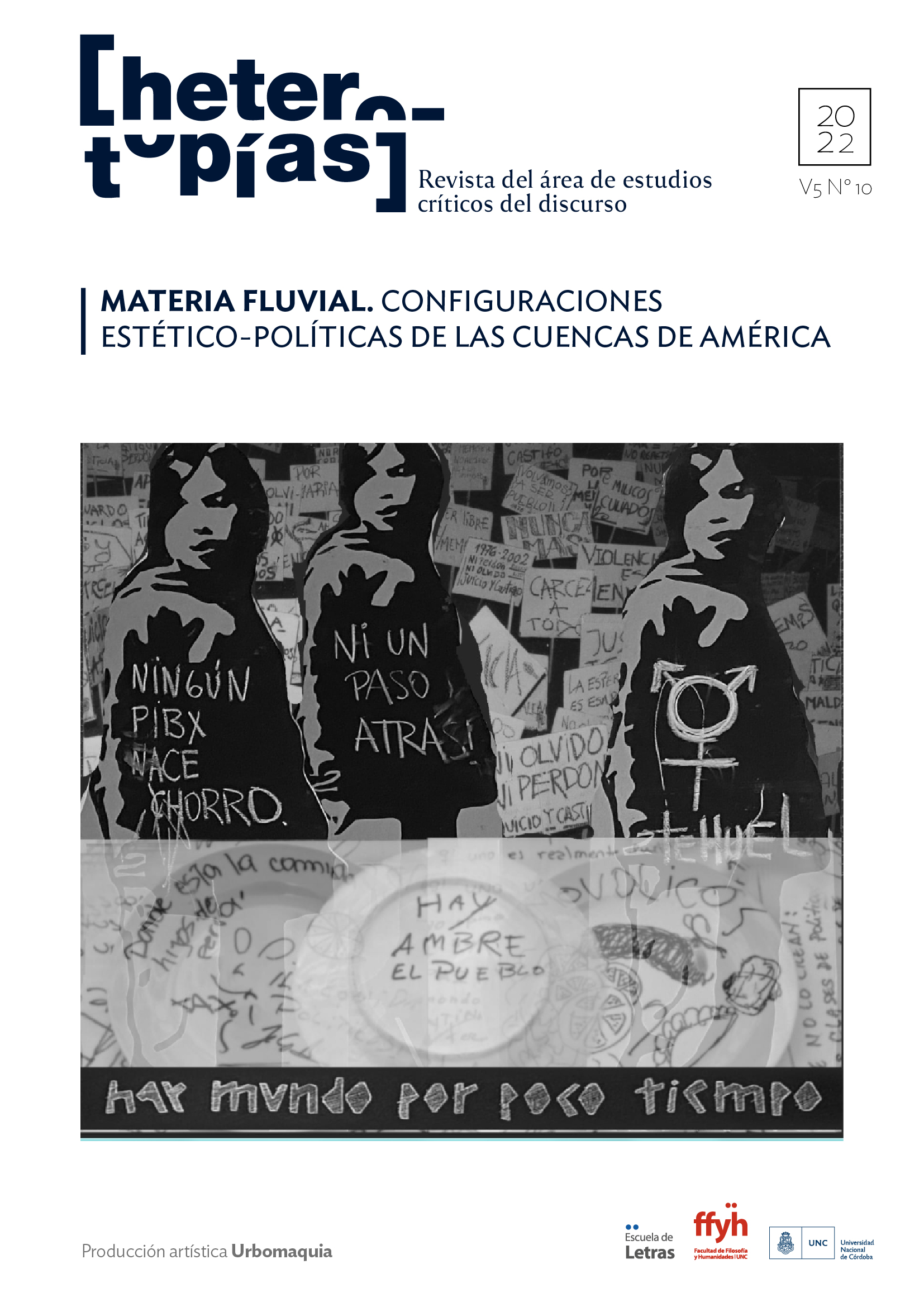Education and re-enchantment of the world. Towards a poetization of educational language
Main Article Content
Abstract
This paper presents a possible conception of the educational that aspires to promote ways of inhabiting the world from a perspective of care and responsibility to life. In this sense, the following reflections try to articulate a pedagogy that guarantees "the right to live and flourish" (Bugallo, 2015). We will follow the thinker Ana Patricia Noguera (2004), who proposes a "reenchantment of the world" that gives an account of the vitality of nature and that invites a poetization of the world, enabling new senses in our ways of inhabiting the earth (Noguera, 2004). In this direction, we propose the need to introduce in educational practices (or, in some cases, deepen) the developments that, for some years now, begin to be carried out in the field of "ecocriticism". Incorporating them in a pedagogical key represents a fundamental contribution in the construction of alternative views on the earth that encourage ways of relating critically and responsibly to it. By exerting an effect of de-familiarization and estrangement in the face of traditional conceptions of nature (and, also, of the human), ecocriticism invites us to glimpse new ways of conceiving ourselves within the framework of the existing. Finally, with the intention of illustrating the educational value of this ecocritical approach (and its potency in our proposal for the re-enchantment of the world), we will analyze the film El botón de Nácar, by the renowned Chilean filmmaker Patricio Guzmán.
Downloads
Article Details

This work is licensed under a Creative Commons Attribution-NonCommercial-ShareAlike 4.0 International License.
Those authors who have publications with this journal, accept the following terms: Those authors who have publications with this journal, accept the following terms:
a. The authors will keep their copyright and guarantee to the journal the right of first publication of their work, which will be simultaneously subject to the Creative Commons Attribution - Non-Commercial - Share Alike (by-nc-sa) Attribution License; no commercial use of the original work or any derivative works is allowed, the distribution of which must be done with a license equal to the one that regulates the original work.
b. Authors may adopt other non-exclusive license agreements for the distribution of the published version of the work (e.g., deposit it in an institutional telematic archive or publish it in a monographic volume) provided that the initial publication in this journal is indicated.
c. Authors are allowed and recommended to disseminate their work through the Internet (e.g. in institutional telematic archives or on their website) before and during the submission process, which may lead to interesting exchanges and increase the number of citations of the published work. (See The effect of open access).
How to Cite
References
Bárcena, F. (2012). El aprendiz eterno. Filosofía, educación y el arte de vivir. Buenos Aires, Argentina: Miño y Dávila.
Bugallo, A. (2015). Filosofía ambiental y ecosofías. Arne Naess, Spinoza y James. Buenos Aires, Argentina: Prometeo.
Cuello, N. (2019). Presentación: El futuro es desilusión. En S. Ahmed, La promesa de la felicidad. Una crítica cultural al imperativo de la alegría (pp. 11-20). Buenos Aires, Argentina: Caja Negra.
Derrida, J. (2008). El animal que luego estoy si(gui)endo. Madrid, España: Trotta.
De Sousa Santos, B. (2010). Descolonizar el saber, reinventar el poder. Montevideo, Uruguay: Trilce.
Escobar, A. (2014). La invención del desarrollo. Popayán, Colombia: Universidad del Cauca.
Flores, V. (2019). Esparcir la incomodidad. El presente de los feminismos entre la fascinación y el desencanto. [Trabajo presentado en el Primer Encuentro Internacional Arte y Política en América Latina, Universidad Nacional Autónoma de México, Ciudad de México]. Recuperado de https://docer.com.ar/doc/enx11n
Federici, S. (2020). Reencantar el mundo. El feminismo y la política de los comunes. Ciudad Autónoma de Buenos Aires, Argentina: Tinta Limón.
Glotfelty, C. (1996). Introduction. Literary Studies in an Age of Environmental Crisis. En C. Glotfelty y H. Fromm (eds.), The Ecocriticism Reader. Landmarks in Literary Ecology. Atenas, Grecia y Londres, Inglaterra: The University of Georgia Press.
Guzmán, P. (productor y director). (2015). El botón de Nácar [película documental]. Chile: Atacama Productions, Valdivia Film, Mediapro. Recuperado de
https://www.youtube.com/watch?v=SgLZUwqcHDQ
Haraway, D. (1996). Seguir con el problema. Generar parentesco con el Chthuluceno. Buenos Aires, Argentina: Consonni.
Heidegger, M. (1996). Caminos de bosque. Madrid, España: Alianza.
Larrosa, J. (2019). Esperando no se sabe qué. Sobre el oficio de Profesor. Buenos Aires, Argentina: Noveduc.
Mignolo, W. (2000). La colonialidad a lo largo y a lo ancho: el hemisferio occidental en el horizonte colonial de la modernidad. En E. Lander (comp.), La colonialidad del saber: eurocentrismo y ciencias sociales. Perspectivas latinoamericanas (pp. 55-85). Buenos Aires, Argentina: CLACSO.
Noguera, A. P. (2004). El reencantamiento del mundo. México: Programa de las Naciones Unidas para el Medio Ambiente - PNUMA - Oficina Regional para América Latina y el Caribe / Manizales: Universidad Nacional de Colombia.
Noguera, A. P. (2010). Cuerpo-Tierra. Ethos ambiental en clave de la lengua de la Tierra. En Sustentabilidad(es) 2, 180-191. Bogotá, Colombia: UNAD.
Noguera, A. P. y Giraldo, O. F. (2017). ¿Para qué poetas en Tiempos de extractivismo ambiental? En H. Alimonda, C. Toro Pérez y M. Facundo (comps.), Ecología política latinoamericana: pensamiento crítico, diferencia latinoamericana y rearticulación epistémica (pp. 69-92). Ciudad Autónoma de Buenos Aires, Argentina: CLACSO. Recuperado de http://biblioteca.clacso.edu.ar/clacso/gt/20171030111951/GT_Ecologia_politica_Tomo_I.pdf
Noguera, A. P., Ramírez, L., Echeverri, S. M. (2020). Métodoestesis: Los caminos del sentir en los saberes de la tierra una aventura geo-epistémica en clave sur. En Revista de Investigación Agraria y Ambiental, 11(3), 45–64. Bogotá, Colombia. Recuperado de https://hemeroteca.unad.edu.co/index.php/riaa/article/view/3897/3912
Shiva, V. (2006). Manifiesto por una democracia de la tierra. Justicia, sostenibilidad y paz. Barcelona, España: Paidós.
Skliar, C. y Téllez, M. (2008). Conmover la educación. Ensayos para una pedagogía de la diferencia. Buenos Aires, Argentina: Noveduc.
Solana, M. (2020). Afectos y emociones. ¿una distinción útil? En Diferencia(s). Revista de Teoría Social Contemporánea, 10, 29-40. Ciudad Autónoma de Buenos Aires, Argentina. Recuperado de http://www.revista.diferencias.com.ar/index.php/diferencias/article/view/206/134
